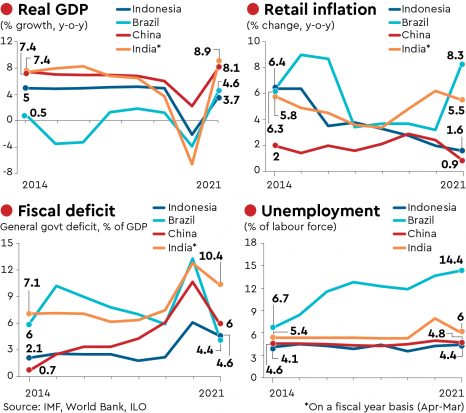While a broadening & deepening of the welfare state is a big positive, the economic track record could have been much better.
Speaking at a public meeting in Gujarat on Saturday, Prime Minister Narendra Modi gave a long list of his government’s achievements on the social welfare front. Modi, who completed eight years in office on May 26, has indeed walked the talk. There isn’t any doubt that a broadening and deepening of the welfare state has allowed him to retain unmatched levels of popularity. The economic track record, however, could have been much better.
In the initial part of his prime ministership, benign global crude prices helped him to put a leash on the budget deficits and thereby India’s high public debt, making it an an outlier among emerging nations. In 2015-16, India also snatched the statistical glory of being “the fastest growing major economy” from China and clung to that status in the subsequent year too, before losing it to the neighbour in 2017-18. It’s a different matter that China’s economy is nearly five times India’s.
India’s economic growth had taken a hit, even before the pandemic wreaked havoc across the globe. The pandemic and external shocks have inflated public debt much further in recent years. Despite the slack in the economy, inflation has tended to rise alarmingly in recent months, as external factors turned unfavourable. In 2014, there were expectations of a double-digit growth, but in 2022, the growth is expected to be around 7%.
As Modi enters the fourth year of his second term as PM, a deep slowdown—if not recession—in the west, the travails of China and India’s relative insularity to the global shocks can let India consolidate its recently regained faster-growing-economy status. However, the government will have to answer tough questions over “jobless growth” and struggle to find resources for sustaining growth itself.
https://www.financialexpress.com/economy/modis-8-years-and-the-economy/2541141/





